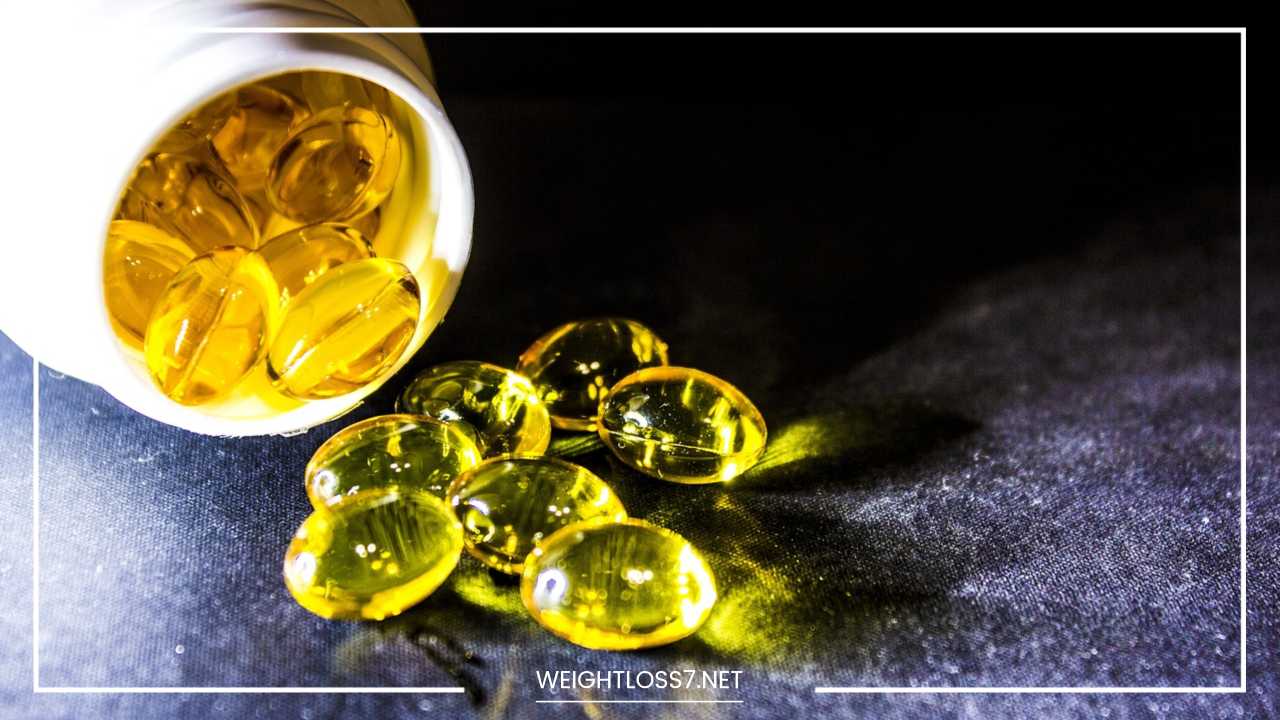Fish Oil for Weight Loss: Unveiling the Science and Strategies for Success

Fish Oil for Weight Loss
Fish Oil for Weight Loss: Does Fish Oil Help with Weight Loss? A Deep Dive into the Research
Fish oil supplements have become a mainstay in the health and wellness world, lauded for their potential to combat a range of concerns. Weight loss is a major area where fish oil finds itself touted, but is the hype truly justified? Let’s embark on a deeper dive into the science behind fish oil and weight management.
We’ll explore its potential benefits, limitations, and how to effectively incorporate it into a sustainable weight loss plan.
Unveiling the Powerhouse: Omega-3s and Their Role in Weight Management
The potential weight loss effects of fish oil can be attributed to its rich content of omega-3 fatty acids, particularly eicosapentaenoic acid (EPA) and docosahexaenoic acid (DHA).
These essential fats play a crucial role in various bodily functions, and research suggests they might influence weight management through several mechanisms:
-
Appetite Regulation Symphony: Studies suggest omega-3s act like conductors in the orchestra of hormones responsible for hunger and satiety. Fish oil may increase levels of peptide YY (PYY), a hormone that signals fullness, and decrease ghrelin, the “hunger hormone.” This hormonal influence can lead to reduced calorie intake, making it easier to stick to a calorie deficit – a key factor for weight loss [1].
-
Metabolic Rate Modulation: Some research suggests omega-3s may act as a gentle nudge to your metabolic rate, the number of calories your body burns at rest. While the increase might be modest, it could contribute to a slight rise in daily calorie expenditure, aiding weight loss efforts in the long run [2].
-
Body Composition Concerto: While evidence is still evolving, some studies suggest omega-3s might play a role in a fascinating metabolic dance – promoting fat loss while potentially encouraging muscle gain. This could be particularly beneficial for those seeking to improve body composition and achieve a toned physique while shedding weight [3].
It’s important to establish realistic expectations. The research on fish oil and weight loss is ongoing, and results can vary depending on individual factors like diet, exercise routine, and genetics. Some studies show modest benefits in the range of 1-3 pounds of weight loss over several weeks, while others show little to no effect.
Here’s the key takeaway: Fish oil, when combined with a healthy lifestyle, might offer a supportive nudge in the right direction for weight loss.
Beyond Weight Loss: The Broader Symphony of Fish Oil’s Benefits
While weight loss is a common focus, fish oil offers a wider range of potential health benefits that contribute to overall well-being:
-
Heart Health Harmony: Omega-3s are well-known for their role in supporting a healthy heart by lowering triglycerides, reducing inflammation, and potentially improving blood pressure [4]. This translates to a reduced risk of heart disease, the leading cause of death globally.
-
Brain Function Sonata: Studies suggest omega-3s may play a vital role in cognitive function and may benefit brain health as we age. They may help with memory, learning, and concentration, potentially reducing the risk of cognitive decline [5].
-
Joint Health Minuet: Fish oil’s anti-inflammatory properties may help alleviate symptoms of joint conditions like rheumatoid arthritis. By reducing inflammation, omega-3s can contribute to improved joint mobility and function [6].
If you’re considering incorporating fish oil supplements into your routine, it’s crucial to discuss them with your doctor, especially if you have any underlying health conditions or take medications.
They can advise you on the appropriate dosage and ensure it doesn’t interfere with any existing medications.
Navigating the Fishy Waters: Choosing the Right Fish Oil Supplement
With a plethora of fish oil supplements lining drugstore shelves, choosing the right one can feel like navigating a maze. Here are some key factors to consider to ensure you’re getting the most out of your fish oil:
-
Dosage Deciphering: Doses for weight loss purposes typically range from 2-6 grams per day. However, it’s crucial to consult your doctor for personalized recommendations based on your individual needs and health status.
-
EPA and DHA Content: Not all fish oil supplements are created equal. Look for supplements with a higher ratio of EPA and DHA. These are the most studied omega-3s for weight management and offer the most well-documented health benefits.
-
Triglyceride vs. Ethyl Ester Form: When it comes to absorption, the triglyceride form of fish oil reigns supreme. Choose supplements formulated with triglycerides for optimal absorption by your body.
-
Purity and Sustainability: Opt for reputable brands that prioritize purity through third-party testing. Look for certifications that ensure the absence of contaminants like mercury. Additionally, consider brands committed to sustainable sourcing practices to protect marine ecosystems.
Remember, fish oil supplements can have a fishy aftertaste, which can be unpleasant for some people. Here are a few ways to minimize it:
-
Choose flavored options: Many brands offer fish oil supplements with a citrus or lemon flavoring that can help mask the fishy taste.
-
Take them with meals: Taking the supplements with a meal can help reduce the aftertaste by allowing the food to coat your mouth and dilute the fishy flavor.
-
Opt for enteric-coated capsules: These capsules have a special coating that delays their release until they reach your intestines, minimizing the chance of the fishy oil coming into contact with your taste buds.
By implementing these tips, you can enjoy the potential benefits of fish oil without having to endure the unpleasant aftertaste.
Unveiling the Recipe for Success: Combining Fish Oil with a Healthy Lifestyle
Fish oil, while potentially beneficial, is not a magic bullet for weight loss. To maximize its effectiveness and achieve sustainable weight loss, consider these key strategies:
-
Prioritizing a Balanced Diet: Focus on a diet rich in fruits, vegetables, and whole grains. Include lean protein sources like fish, poultry, and legumes to keep you feeling satisfied. Limit processed foods, sugary drinks, and unhealthy fats like saturated and trans fats. These foods are often calorie-dense and nutrient-poor, hindering weight loss efforts.
-
Embracing Regular Exercise: Engage in regular physical activity for optimal weight loss and overall health. Aim for at least 150 minutes of moderate-intensity exercise or 75 minutes of vigorous-intensity exercise per week as recommended by the Centers for Disease Control and Prevention (CDC). [7] Incorporate both cardio and strength training into your routine. Cardio helps burn calories and improve cardiovascular health, while strength training helps build muscle mass, which can further boost your metabolism.
-
Adequate Sleep Symphony: Aim for 7-8 hours of quality sleep each night. Sleep deprivation can disrupt hormones that regulate appetite and metabolism. When you’re sleep-deprived, your body produces more ghrelin (the hunger hormone) and less leptin (the satiety hormone), leading to increased cravings and difficulty controlling calorie intake.
-
Stress Management Serenade: Chronic stress can wreak havoc on your weight loss efforts. The stress hormone cortisol can increase appetite and promote cravings for unhealthy foods. Explore stress-management techniques like yoga, meditation, deep breathing, or spending time in nature to help manage stress levels and support your weight loss journey.
By combining fish oil supplementation with a healthy lifestyle that incorporates these strategies, you create a holistic approach to weight loss that promotes long-term success.
Addressing the Not-So-Fishy Side: Potential Side Effects and Considerations
Fish oil is generally safe for most people when taken at recommended doses. However, be aware of potential side effects:
-
Burping or Reflux: The fishy aftertaste can sometimes lead to burping or heartburn. Consider taking the supplement with meals or choosing enteric-coated capsules that are designed to delay release until they reach your intestines, minimizing the fishy aftertaste and potential for heartburn.
-
Blood Thinning Effects: If you take blood-thinning medications like warfarin, consult your doctor before starting fish oil, as it may increase your bleeding risk. Your doctor may adjust your medication dosage or recommend alternative supplements.
-
Blood Sugar Management: While generally not a concern for healthy individuals, fish oil may slightly lower blood sugar levels. If you have diabetes or take medications to manage blood sugar, monitor your blood sugar levels closely and discuss any concerns with your doctor.
It’s important to remember that fish oil is not a substitute for a healthy diet and exercise. It’s a potential supportive tool to be used alongside a comprehensive weight loss plan.
Unveiling the Future: Ongoing Research and Emerging Applications
The research on fish oil and its health benefits is constantly evolving. Here’s a glimpse into some exciting areas of ongoing exploration:
-
Personalized Medicine: Researchers are exploring the potential for personalized approaches to fish oil supplementation, tailoring dosages and formulations based on individual needs and genetic factors. This could lead to more targeted and effective use of fish oil for weight management and other health concerns.
-
Mental Health Benefits: Studies are investigating the potential role of fish oil in supporting mental health. Some research suggests omega-3s may play a role in reducing symptoms of depression and anxiety.
-
Inflammatory Conditions: Research continues to explore the anti-inflammatory properties of omega-3s and their potential benefits in managing various inflammatory conditions beyond joint health, such as inflammatory bowel disease and asthma.
As research progresses, we can expect a deeper understanding of fish oil’s potential to promote weight loss and overall well-being.
Final Word: Unveiling a Supportive Tool for Weight Loss
Fish oil offers a range of potential health benefits, and while its weight loss effects may be modest, it can be a valuable tool when used strategically.
By understanding the science behind fish oil, choosing the right supplement, and incorporating it into a healthy lifestyle, you can unlock its potential to support your weight loss journey.
Remember, consistency and a commitment to a healthy lifestyle are key to achieving and maintaining your weight loss goals.

















